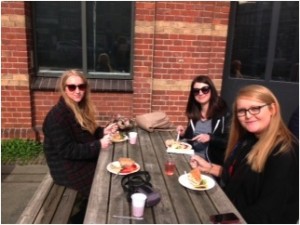‘There is no such thing as sexuality’, writes the French psychoanalyst Jaques Lacan, a statement hard to swallow in a society seemingly saturated by sex and sexuality. Sex, perhaps more apparent now than ever, seems to be the driving force of life, an integral part of our culture, and the way we come to define ourselves.
Pop music, increasingly, serves as both an outlet and a stage upon which the sexual fantasies of society are exorcised, performed, and consumed. In a recent interview, Lady Gaga told the press how ‘sex is an inspiration for everyone, and I don’t think there is one song that’s ever been written that sex wasn’t a part of. That’s what makes the world go round’.
Modern psychoanalysis, however, reveals these desires as nothing more than an attempt to overcome a sense of incompleteness or lack, and attain an imagined sense of wholeness or unity.
This is exemplified, perhaps surprisingly, by 90s pop sensation All Saints in their hit song ‘Pure Shores’, which merges the notion of sexual conquest with that of self-discovery, and the longing for a sense of home; ‘the beach’.
The beach, the object of desire, at once the lover and a thinly veiled metaphor for the paradise of sexual fulfillment, is searched for ‘along many moors’, ‘through many doors’, ‘across deserts’, across ‘water for miles’, and yet remains fundamentally ‘out of reach’. ‘I’m coming’, repeatedly sing All Saints, a double entendre suggesting both the momentary bliss of orgasm, and the larger never-ending journey towards the beach of eternal bliss.
This beach, we come to learn, is not only unattainable, but also imaginary; the singer(s) having ‘never been here before’ (at a brief moment of arrival, perhaps in a dream, as the lyrics immediately revert to longing once again). This is, as Slavoj Zizek writes, ‘the impossible object cause of desire that inaugurates desire itself’. This object of desire doesn’t exist because it is imaginary, leaving the singer permanently in search ‘of more’, left with an insatiable appetite in the pursuit of perfection, or as Lacan might say, for the lost sense of unity first imagined in the mirror stage of infancy. Hence the beach becomes a place ‘I can call mine’, a place where I can own myself, become autonomous and whole. The journey to the beach becomes an escape from the world of mutability to one of permanence and complete ownership.
The desire for the beach can also be seen as a desire for death. The beach becomes symbolic not just of physical bliss, but the eternal spiritual bliss associated with the afterlife. The beach is heaven, a place where one can stop ‘moving’, ‘coming’, and cease to be.
The notion of an unattainable beyond-space also bears similarities to Lacan’s notion of the Real, that which escapes symbolization, the leftover from reality which language fails to adequately describe. As Sean Homer writes, according to Lacan, ‘the real is that which is unsymbolizable. It is beyond the symbolic and the imaginary and acts as a limit to both’. The sea, the desert, the countless doors through which the singer navigates, can therefore be seen as metaphors for the barren, impotent symbolic order of the world in which we are born, one which can signal obliquely but cannot fully represent the Real. The Beach, and the desire for the beach, is an attempt to mask over this void, or gap in the symbolic order.
Rather than deny the existence of sexual relationships, Lacan’s psychoanalytic theory reveals our sexual desires as always being the manifestation of something else, a deeper, darker desire to achieve a lost unity, which can be found lurking beneath the surface of even the most fatuous of pop songs.
Jack Thurland, 2nd Year English Literature.

